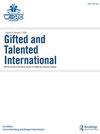Editorial
Q3 Social Sciences
引用次数: 0
Abstract
For this final issue for 2022 of Gifted and Talented International we have a diverse range of research from various international scholars that focuses on different issues which affect the development of gifted and talented students. The research comes from different educational contexts including the United States of America, Vietnam, Netherlands, Lebanon, Turkey, South Korea, and Norway. The first research article by Foley-Nicpon, Candler, Behrens, Sussman, Gaasedelen and Wienkes reported on their development of a 36item High Functioning ASD Screener. Researchers conducted content area expert interviews that underpinned the 93 item pilot form, which was administered to groups of high ability students with ASD, average ability students, and high ability students. ANOVAs identified items that differentiated the three groups and/or were most endorsed by the high ability/ASD group to develop the final item pool. Nelson, Tran, Reichenberg, and Vu examined life satisfaction of gifted adults in their mid-twenties who graduated ten years previously from a gifted program in Vietnam. The researchers used the Flanagan’s Quality of Life Scale (QoLS) as their research instrument. Participants indicated high life satisfaction consistently across five identified domains: Physical and material well-being, Relations with other people, Social, community, and civic activities, Personal development and fulfillment, and Recreation. A qualitative study by Veldman-de Jonge and Jen explored the facilitating or hindering factors in making education, personal life, and career decisions among 10 gifted and talented women aged 18–62 from the Netherlands. When making career choices, these Dutch gifted women reported they valued intrinsic motivation, differentiation, and the quality of their work. Antoun employed qualitative and quantitative methods to study the relation between primary school teachers’ background and school type across three governorates in Lebanon. Antoun examined Lebanese teachers’ perceptions of gifted and talented youth and their gifted education experiences through disseminating a questionnaire and conducting semi-structured interviews. Findings suggested that the broader socio-economic cultural context within Lebanon influenced teachers’ perceptions and choices of gifted education provisions made in their classrooms. A study by Yazgi Yanik and Afat aimed to determine the relationship between metacognitive awareness and social-emotional learning skills among gifted and talented students in grades 6, 7 and 8 in Istanbul, Turkey. Results showed that little time on screens, having a highly educated mother, and high perception of school success resulted in a difference in metacognitive awareness and social emotional learning skills among the gifted and talented students. South Korean pre-service primary school teachers’ attitudes about acceleration for gifted students were examined by Woo, Cumming, and O’ Neill. In this mixed-methods study, researchers used surveys and focus group interviews with their participants. Survey results suggested these teachers had slightly negative attitudes toward acceleration. When participants’ attitudes were examined further in focus groups, these seemed to stem from negative feelings associated with the South Korean competitive educational environment and possible negative social and emotional effects of acceleration. The final article in this issue is a descriptive study of primary and secondary teachers conducted by Lenvik, Jones, and Hesjedal that focused on teachers’ perspectives of gifted students with GIFTED AND TALENTED INTERNATIONAL 2022, VOL. 37, NO. 2, 83–85 https://doi.org/10.1080/15332276.2022.2157979社论
对于《天才与天才国际》2022年的最后一期,我们有来自不同国际学者的各种研究,重点关注影响天才与天才学生发展的不同问题。这项研究来自不同的教育背景,包括美利坚合众国、越南、荷兰、黎巴嫩、土耳其、韩国和挪威。Foley Nicpon、Candler、Behrens、Sussman、Gaasedelen和Wienkes的第一篇研究文章报道了他们开发的36项高功能ASD筛查仪。研究人员进行了内容领域专家访谈,这是93项试点表格的基础,该表格针对自闭症谱系障碍的高能力学生、中等能力学生和高能力学生进行。方差分析确定了区分三组和/或最受高能力/ASD组认可的项目,以开发最终项目库。Nelson、Tran、Reichenberg和Vu研究了十年前从越南一个天才项目毕业的20多岁的天才成年人的生活满意度。研究人员使用弗拉纳根生活质量量表(QoLS)作为他们的研究工具。参与者在五个确定的领域中始终表现出较高的生活满意度:身体和物质幸福感、与他人的关系、社交、社区和公民活动、个人发展和成就感以及娱乐。Veldman de Jonge和Jen的一项定性研究探讨了来自荷兰的10名18-62岁的天才女性在做出教育、个人生活和职业决策方面的促进或阻碍因素。在做出职业选择时,这些荷兰天才女性表示,她们重视内在动机、差异化和工作质量。Antoun采用定性和定量方法研究了黎巴嫩三省小学教师背景与学校类型之间的关系。Antoun通过分发问卷和进行半结构化访谈,调查了黎巴嫩教师对天才青年的看法以及他们的天才教育经历。调查结果表明,黎巴嫩更广泛的社会经济文化背景影响了教师对课堂上提供的天才教育的看法和选择。Yazgi Yanik和Afat的一项研究旨在确定土耳其伊斯坦布尔6、7和8年级天才学生的元认知意识与社会情感学习技能之间的关系。研究结果显示,很少有时间在屏幕上,有受过高等教育的母亲,以及对学校成功的高度认知,导致天才和天才学生在元认知意识和社会情感学习技能方面存在差异。Woo、Cumming和O’Neill研究了韩国小学职前教师对天才学生加速的态度。在这项混合方法的研究中,研究人员对参与者进行了调查和焦点小组访谈。调查结果表明,这些教师对加速有轻微的负面态度。当在焦点小组中进一步检查参与者的态度时,这些态度似乎源于与韩国竞争性教育环境相关的负面情绪,以及加速可能产生的负面社会和情绪影响。本期的最后一篇文章是Lenvik、Jones和Hesjedal对中小学教师进行的描述性研究,重点关注教师对天才学生的看法https://doi.org/10.1080/15332276.2022.2157979
本文章由计算机程序翻译,如有差异,请以英文原文为准。
求助全文
约1分钟内获得全文
求助全文

 求助内容:
求助内容: 应助结果提醒方式:
应助结果提醒方式:


